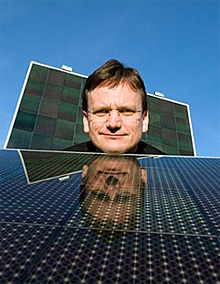
|
 |
 |
 Technology News | January 2008 Technology News | January 2008  
Solar Power Challenges Oil
 Mike Byfield - DOB Magazine Mike Byfield - DOB Magazine
go to original


| | Martin Roscheisen, founder and CEO of Nanosolar Inc. | | |
Martin Roscheisen, founder and CEO of Nanosolar Inc., says solar power is poised to eventually replace large volumes of imported crude oil in North America. The California-based firm claims that its sunlight-fuelled technology can create electricity at a cost competitive with coal-fired generation. That CO2-free electricity will in turn replace gasoline through the increased use of hybrid cars like the Toyota Prius, according to Roscheisen. "The solar electricity-powered car is unstoppable. It will be the one thing that people recognize they massively underestimated looking backwards in ten years," he told DOB Magazine last week.

Nanosolar has raised upwards of $100 million from the United States Department of Energy, Google's co-owners, eBay and other Silicon Valley players. In December, after five years of development, the secretive private company shipped its first commercial batch of thin-film solar cells, called PowerSheets. A chemical compound of photovoltaic nanoparticles - as thin as a coat of paint - is "printed" rapidly on flexible aluminum panels. Unlike conventional solar technology, there's no use of fragile, expensive silicon. Nanosolar is building what promises to be the world's largest solar panel manufacturing facility in San Jose and has scheduled a second panel manufacturing plant and commercial generating station in Germany.

Electricity's potential for replacing a big chunk of oil in the transportation fuel mix is supported by Montana's Governor Brian Schweitzer. When the coal-rich state's popular chief visited Calgary in late October (The U.S. Must Develop The Rockies Energy Corridor Or Face More Mideast Wars), he told this publication that maximizing the use of hybrid cars like the Prius could ultimately eliminate a whopping 80% of America's crude imports. "We're talking current automotive technology, not some futuristic scenario," said Schweitzer, who was an agricultural scientist before entering politics. The vehicles' batteries, he suggested, could be recharged inexpensively at night when the North American power grid typically has minimal loads.

Electric vehicles are under intense development. In a strategic bid to salvage its own future, General Motors is gambling heavily on its proposed flex-fuel Chevrolet Volt. If lithium ion batteries improve as quickly as GM hopes, the four-seat Volt will have a driving range of 1,000 kilometres. All of this is music to Roscheisen's ears. Nanosolar's biggest concern, its CEO says, is expanding its manufacturing capacity to gain a predominant market share before solar rivals come up with their own thin-film generating technologies | 
 | |
 |



